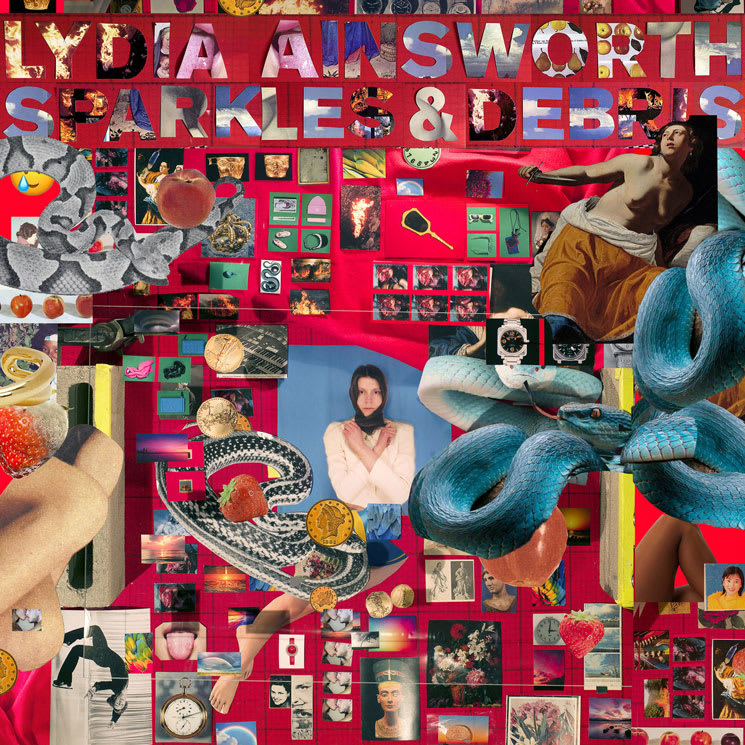For anyone who attempts to dissect Lydia Ainsworth's art, be it her handful of LPs, her select movie scores, or her arresting music videos, it probably needs to be understood that she knows exactly what she's doing. An artist as seasoned and highly educated (with degrees in music composition from McGill and New York University) as Ainsworth doesn't just throw things against the wall to see what will stick.
It's this exact theory that makes Sparkles & Debris, the Toronto musician's fourth full-length, such a head-scratcher. Ainsworth spent her first two records beefing up her gorgeously swirling take on baroque dance pop, adding levels of lushness to 2017's Darling of the Afterglow before stripping it all back on 2019's Phantom Forest without losing any of the drama that defines her craft. But across the 11 tracks and 34 minutes that make up her latest, Ainsworth seems completely lost at times.
Opening track "Parade" takes on a slick sophisti-pop sound with so much fastidiousness and accuracy that it loses all personality and any sense of urgency, while "Forever" finds Ainsworth crafting a rhythmically dense melody that attempts to travel down the same avenues as '70s Bee Gees but runs out of steam at the chorus, right where the brothers Gibb would soar. The jittery "Cosmic Dust" comes off as a paint-by-numbers 21st-century R&B track but ends up sounding much less adventurous or candid than anything by Solange or Janelle Monáe. Her cover of Chic's iconic "Good Times" is delivered in a slowed-down, brooding way that it comes off more like something you'd find in the dredges of YouTube than from someone with her pedigree.
As the second half of Sparkles & Debris begins to unravel, Ainsworth's tracks begin to sound more relaxed, less forced and much more authentic. "Halo of Fire" skitters along nicely, layering echoed Prince-type guitar solos with busy vocals and a perfectly-placed moody spoken word. The unvarnished "Queen of Darkness" shows Ainsworth breaking her phrasings into sharper bites, creating a more urgent sound than anything else found across the LP, while "All I Am" is a ambient piece that displays just how well she's able to embrace new age and folktronica.
Throughout Sparkles & Debris, Lydia Ainsworth clearly attempts to move her craft forward. And although she howls on the title track, "I've got nothing to prove," the tracks that fail to connect with the listener tell a completely different story.
(Zombie Cat)It's this exact theory that makes Sparkles & Debris, the Toronto musician's fourth full-length, such a head-scratcher. Ainsworth spent her first two records beefing up her gorgeously swirling take on baroque dance pop, adding levels of lushness to 2017's Darling of the Afterglow before stripping it all back on 2019's Phantom Forest without losing any of the drama that defines her craft. But across the 11 tracks and 34 minutes that make up her latest, Ainsworth seems completely lost at times.
Opening track "Parade" takes on a slick sophisti-pop sound with so much fastidiousness and accuracy that it loses all personality and any sense of urgency, while "Forever" finds Ainsworth crafting a rhythmically dense melody that attempts to travel down the same avenues as '70s Bee Gees but runs out of steam at the chorus, right where the brothers Gibb would soar. The jittery "Cosmic Dust" comes off as a paint-by-numbers 21st-century R&B track but ends up sounding much less adventurous or candid than anything by Solange or Janelle Monáe. Her cover of Chic's iconic "Good Times" is delivered in a slowed-down, brooding way that it comes off more like something you'd find in the dredges of YouTube than from someone with her pedigree.
As the second half of Sparkles & Debris begins to unravel, Ainsworth's tracks begin to sound more relaxed, less forced and much more authentic. "Halo of Fire" skitters along nicely, layering echoed Prince-type guitar solos with busy vocals and a perfectly-placed moody spoken word. The unvarnished "Queen of Darkness" shows Ainsworth breaking her phrasings into sharper bites, creating a more urgent sound than anything else found across the LP, while "All I Am" is a ambient piece that displays just how well she's able to embrace new age and folktronica.
Throughout Sparkles & Debris, Lydia Ainsworth clearly attempts to move her craft forward. And although she howls on the title track, "I've got nothing to prove," the tracks that fail to connect with the listener tell a completely different story.
